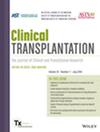Naples Prognostic Score May Be Associated With Acute Rejection in Kidney Transplant Patients: A Single Center Experience
Abstract
Background
The Naples Prognostic Score (NPS) is a comprehensive measure of patients' inflammatory and nutritional status. In this study, we compared the preoperative NPS of kidney transplant recipients who experienced acute rejection (AR) with those who did not.
Materials and Methods
This retrospective study included 294 patients who underwent kidney transplantation and were followed up at our hospital between January 2012 and January 2024. NPS was calculated based on laboratory values obtained 1 day before the transplantation surgery. Patients were divided into two groups according to the occurrence of biopsy-proven acute rejection (AR): Group A consisted of patients who developed AR, and Group B comprised those without AR.
Results
Our analysis revealed a significant difference between Group A and Group B regarding donor type (living or cadaveric) (p = 0.016). Furthermore, a significant difference was observed in the comparison of the Naples Prognostic Score (p = 0.014). The subsequent multivariate analysis showed that cadaveric donor status significantly increased the risk of acute rejection (HR = 2.935 [95% CI, 1.250–6.893], p = 0.013). Additionally, patients with a Naples score of 3–4 had a higher risk of acute rejection compared to those with a score of 0–2 (HR = 2.142 [95% CI, 1.160–3.955], p = 0.015).
Conclusions
Preoperative Naples Prognostic Score, may influence the risk of acute rejection in the postoperative period. A higher NPS is associated with an increased risk of acute rejection, which may subsequently lead to graft dysfunction.

 求助内容:
求助内容: 应助结果提醒方式:
应助结果提醒方式:


